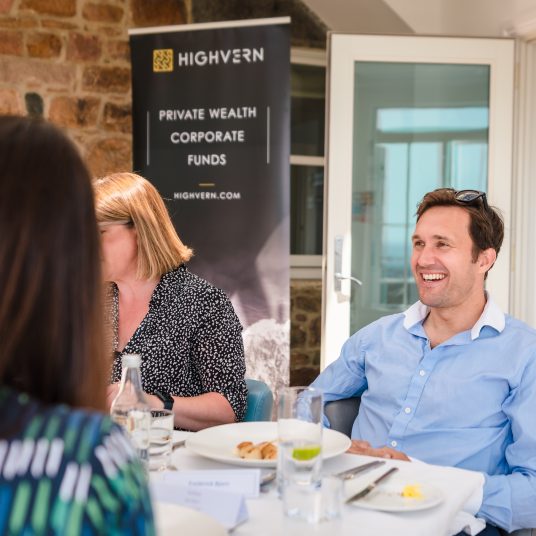
HIGHVERN welcomed guests to the stunning location of The Orangery at Le Fregate in Guernsey, for a Private Wealth Round Table lunch event, bringing together some of the most prominent and highly regarded UK wealth advisory practitioners. Hosts Richard Joynt, Kerrie Le Tissier and Hugh O’Donnell were on hand to guide the industry experts through some of the most topical issues facing private client practitioners today. They were joined by Federick Bjorn (Payne Hicks Beach), Jonathan Shankland (Weightmans LLP), Hugh Gunson (Charles Russell Speechlys LLP), Charlotte Howard (Macfarlanes LLP), Ben Havard (Collas Crill), and Emma Jordan (Taylor Wessing).
THE RISE OF THE PTC AND THE NEED TO MANAGE UNFORESEEN DISADVANTAGES
Richard Joynt introduced the first topic of discussion, whether the use of Private Trust Companies (PTCs) sometimes have unforeseen disadvantages. Although they can be used to great advantage to offer families more participation or influence in a trust structure, potential issues can arise when the family directors of the PTC don’t fully understand their duties. In addition, conflicts can arise from family members wearing too many different hats across the structure (e.g. as directors, beneficiaries or controllers of trading companies owned by the structure).
Mr Gunson said that he had experienced issues around the control of PTCs following the death of the former shareholder(s), in turn leading to unexpected issues for the administration of related trusts. Ms Howard pointed out that using PT Foundations could counter this issue, as this is an orphan vehicle. Ms Jordan agreed that the PTC vehicle does have the attraction of permitting the family a greater degree of control over their assets in trust, but that she had seen a situation where conflict had arisen where there was a majority of family members on the board and a minority of qualified professionals.
Mr Havard added that times have now changed and there has been a move away from having a single individual trustee in favour of corporate trustees in order to better identify and manage liability. Mr Bjorn pointed out that the key issue for him is always who is going to wield control within the structure, will it be a family member or the professional trustee? The table discussed and agreed that these structures can work well until a disagreement or conflict arises. Mr Gunson said the move to the next generation often brings this to the forefront especially when they have not historically been educated on how these things work. Mr Shankland said the larger issue is generally that families do not understand from the outset what is being put in place and what is expected from them on the board of a PTC. From his experience there can also be a disconnect of information. With trading companies, family members may know more about the business and its activity than they would like to divulge at PTC level to the rest of the board.
Ms Jordan commented that changing regulation may deter family members from being on the board of PTCs as they will slowly start to have more onerous obligations to fulfil such as AML training. It was her belief that professionals will need to fill these roles. She felt that it is very difficult for professionals to extract themselves from trust structures and that legislation was also required to address this. Mr Joynt added that in the coming weeks many Jersey PTCs would be required to be registered with the local regulators in line with the removal of certain AML exemptions. Some clients will welcome the increased regulation to make their structures more obviously robust, whereas others will find the additional workload to be burdensome.
My O’Donnell explained that with the new requirement that all Swiss Trustees be regulated by FINMA, the Swiss authorities have considered the PTC and created a dual system by introducing the DTC or ‘Dedicated Trust Company’ alongside the PTC. The DTC retains the benefits of a tailor-made vehicle, being a type of PTC, while additionally profiting from an institutional setting, much like in Jersey, through the involvement of a professional trustee authorised and supervised by FINMA. Further, the DTC requires no ownership structure such as a purpose trust or foundation and the Trustee becomes the direct shareholder.
MODERN FAMILY TRENDS AND HOW THEY AFFECT TRUST INSTRUMENTS
The second subject the advisers addressed was how gender identity has affected practice in private wealth. Ms Le Tissier said these issues were very topical and had been discussed at the recent STEP Guernsey conference. Trust law and language needs to keep up with evolving family dynamics. For instance, what happens if the Trust Deed specifies that wealth should be left to the eldest son, but that son later becomes a daughter? Ms Le Tissier pointed out that other modern family issues such as surrogacy also require consideration by advisers and trustees.
Mr Havard said he has encountered some Jersey Trusts which have made court applications to make changes to modernise them, but professionals need to be mindful that some Settlors are purposefully restrictive. The attendees discussed the extent to which Settlors can discriminate in their wishes. Can you prevent a Settlor from actively excluding people based on their profile in a family trust instrument? Mr Bjorn commented that certain issues (such as excluding people based on religion) goes against public policy and wouldn’t be permissible. Ms Jordan said it could depend on whether the decisions laid out were made prior to laws forbidding this type of treatment.
Mr Shankland mentioned that his firm had a large LGBT client base and significant experience and expertise dealing with related planning and complexity around the same. He has recently advised a client in a throuple relationship which has raised interesting legal and estate planning issues. Mr Joynt said it was helpful to know that some advisory firms specialised in such areas – clients want to know that you are familiar with the issues they face. Ms Le Tissier said that surrogacy required specialist advice too as its such a wide area. Its also a sensitive subject to bring up with clients- at what point should you broach the subject? Ms Howard added that surrogacy will have an impact on domicile, and (unless the intended parents obtain a parental order) there could be a mismatch between the domicile of the intended parents and the domicile of the child with estate planning consequences. Mr Havard said that the US has the most sophisticated laws when it comes to this subject. Mr Bjorn thought it was antiquated that illegitimate children don’t constitute a child in some trust contexts, given how many children are now born to parents who are not married.
CONSIDERATION OF THE BENEFICIARIES’ WELLBEING
This discussion led onto the final topic of the Round Table which was should trustees be more mindful of the how trust legacies affect those who are to benefit from them? Mr Joynt put it to the table that trustees should do more to understand the interaction between trusts and the mental wellbeing of beneficiaries. Mr Gunson said that children are often wary of inheriting a family business and taking on something they have no significant involvement in and they may not wish to do. Mr Bjorn commented that this topic raises an interesting question as to who the client is, is it the Settlor? He suggested that in a traditional irrevocable trust structure, the Settlor stops being the trustees’ client as soon as the assets are settled into a trust, in which case he asserted that it could be considered that the wider family as a whole is the client. Ms Howard said a lot of understanding is also about managing expectations about what beneficiaries can expect from family trusts and in what circumstances, so that they can plan their lives accordingly. Mr O’Donnell mentioned that particularly in the Middle East it was not uncommon for him to sit with an entire family to discuss the details and consequences of a trust structure, rather than just with the settlors or elder family members. Mr Bjorn concluded that there is a sense of accountability that trustees are expected to know everything about the beneficiaries when clearly, they can’t and don’t. This expectation gap is something that should be talked about and acknowledged to increase transparency.








